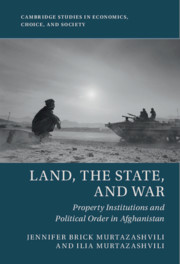Book contents
- Land, the State, and War
- Land, the State, and War
- Copyright page
- Dedication
- Contents
- Photographs and Drawings
- Maps
- Figures
- Tables
- Maps
- Acknowledgments
- Glossary
- Abbreviations
- Chronology of Events
- 1 Introduction
- 2 A Theory of Property Rights
- 3 Property Rights and State Building
- 4 Property Rights and War
- 5 Self-governance of Property Rights
- 6 Self-governance, War, and the Commons
- 7 Self-governance, Legal Titling, and the State
- 8 Are Property Rights a Cause or Consequence of Political Order?
- Appendix
- References
- Index
6 - Self-governance, War, and the Commons
Published online by Cambridge University Press: 20 August 2021
- Land, the State, and War
- Land, the State, and War
- Copyright page
- Dedication
- Contents
- Photographs and Drawings
- Maps
- Figures
- Tables
- Maps
- Acknowledgments
- Glossary
- Abbreviations
- Chronology of Events
- 1 Introduction
- 2 A Theory of Property Rights
- 3 Property Rights and State Building
- 4 Property Rights and War
- 5 Self-governance of Property Rights
- 6 Self-governance, War, and the Commons
- 7 Self-governance, Legal Titling, and the State
- 8 Are Property Rights a Cause or Consequence of Political Order?
- Appendix
- References
- Index
Summary
Chapter 6 considers self-governance of two important types of commons: water and forests. The mirab, or water manager, is a person who works on behalf of a group of communities to ensure members across villages have access to irrigation water. Forest shuras govern use and access to forests. Mirabs and forest shuras are often effective in governing commons, for reasons our theory predicts, but are vulnerable to outside threats that cannot be collectively countered by the community: irrigation infrastructure has often been destroyed during conflict and is too costly for communities to provide, and the Taliban, commanders, or warlords are often able to extract forest resources by force. Thus, our conclusion is that foreign aid and other government assistance should focus on threats from the outside while leaving daily management of the commons to communities. Our analysis thus extends the insights of Elinor Ostrom, who understood well the possibility of self-governance of property, to self-governance in especially fragile, war-ravaged states such as Afghanistan. In such contexts, war – and organizations that come about during war – can be a great destabilizing force for governance of the commons.
Keywords
- Type
- Chapter
- Information
- Land, the State, and WarProperty Institutions and Political Order in Afghanistan, pp. 120 - 138Publisher: Cambridge University PressPrint publication year: 2021

